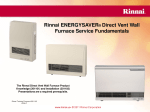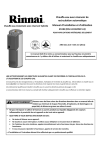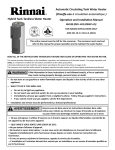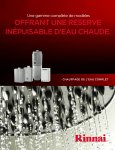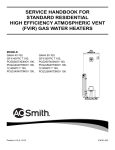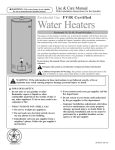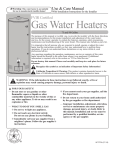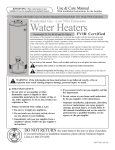Download Rinnai RH180 Product specifications
Transcript
Rinnai RH180 Hybrid Tank – Tankless Water Heater Product Knowledge, Level I 1 Rinnai Service and Support (800-621-9419) CRC – Consumer Response Center – general calls, consumer questions, etc. Available from 8 a.m. to 8 p.m. EST, Monday – Friday. Parts Department – parts orders. Available from 8 a.m. to 8 p.m. EST, Monday – Friday. Warranty Department – warranty claim issues. Available from 8 a.m. to 5 p.m. EST, Monday- Friday. Technical Support Department – technical issues related to the function and repair of all Rinnai products. Available in the office from 8 a.m. to 8 p.m. EST, Monday – Friday AND 24/7/365 on call support for technicians who are at the service location. Technicians only, call 1-888-RINNAIS ( 888-746-6247) Engineering / Applications Department – calls related to product use and applications including sizing. Available from 8 a.m. to 5 p.m. EST, Monday - Friday. Rinnai America also provides the following websites for support: • www.rinnai.us –for installation manuals, product specifications and supporting documents. More technical information is available in the “For Professionals” section of the site under “Partner Portal”. Registration is required for access to this portion of the website. • www.trainingevents.rinnai.us – for registration in Rinnai product training classes and videos (live and online classes). Service and installation manuals and other technical documents are available under the “Resources” section of the site. RH180 Hybrid Tank-Tankless Water Heater Level I Training Program Product Knowledge 3 RH180 Technology Combining Technologies: With the combination of a tank and a Rinnai tankless water heater into one appliance, the RH180 hybrid provides increased hot water capacity with the ease of a tank installation. + 4 = Product Component Identification • ¾ hot water feed into building • 4” B-vent exhaust connection • Combustion air inlet and filter • Pressure relief valve • ¾” cold water supply into tank • 40 gallon storage tank • 120 Volt power cord (not shown) • Tankless water heater engine • Gas connection • Temperature controller • Hot water supply from engine to tank • Circulation pump for tank/engine • Tank drain valve 5 • Cold water supply from tank to engine RH180 Sequence of Operation 6 Sequence of operation: 1. When the water temperature at the bottom of the tank (at the tank thermistor) drops to a pre-determined temperature, the startup sequence will begin. 8. 2. 2. The tankless engine’s combustion fan will begin turning, drawing fresh air from the space. This will allow the flammable vapor sensor to ensure the intake air is free of combustible vapors. 4. 3. The pump will begin circulating water through the tank-tankless loop. 4. The engine will fire when it detects the water flow from the pump. 5. 5. The heated water from the engine will be deposited back into the tank. The water will be directed toward the top of the tank close to where hot water is being drawn into the plumbing system. 3. 6. Initially as water is drawn from the tank into the engine, the Delta T will be fairly large and the engine will operate in a high fire mode. 6. 7. 7. As the water at the bottom of the tank begins to heat, warmer water will then begin to enter the engine — this will reduce the Delta T allowing a higher flow rate through the engine. 1. 8. As the water in the tank continues to warm and gets closer to the set temperature, the tankless engine will automatically reduce its gas input. 9. 9. When the temperature at the bottom of the tank reaches the set point, the pump turns off — the tankless engine will go into a standby mode until the next start sequence. 7 RH180 Water Heater Sizing 8 RH180 Sizing Water Heating Options Max input (Btuh / Kwh) Tank Capacity (gal.) Showers In use at one time Electric Tank Gas Tank Time of available hot water (min.) Time of available hot water (min.) 70⁰ temp rise 70⁰ temp rise Recovery time (min.) 70⁰ temp rise 4.5 Kw 40 21 10 88 34,000 Btu 40 18 8 36 40,000 Btu 50 26 11 40 75,000 Btu 75 50 19 32 91,300 Btu 40 Continuous 11 16 Up to 199,000 Btu N/A Continuous Continuous N/A Rinnai RH180 Hybrid Tank -Tankless Rinnai Tankless • Data is based on a 50⁰F inlet water temperature and a 120⁰F hot water set point (70⁰F rise). • Shower heads assumed to be 2.5 gpm mixed flow rate with 105⁰F at the fixture. • Available hot water time and recovery time based on industry standard calculation methods and Rinnai lab testing. Actual results may vary based on the application. RH180 Product Features & Safety devices 10 Product Features • 180 gallon First Hour Rating. • Quick recovery: Approximately 16 minutes starting from a cold tank. • Thermal Efficiency: 80%. • Temperature controller: 5 temperature settings. • Maintenance/diagnostic codes: Error codes displayed if a fault is detected. • 40 gallon storage tank: Two inches of insulation, no heating element, burner, or vent stack which helps to minimize standby heat loss. • Direct electronic ignition: No standing pilot. • Blue-zircon-glass coated tank. • Uses standard 4” B-Vent. • Can be common vented with a furnace. • Piping configuration and connections same as standard tanks. • 1/2” gas line connection. • Water is heated in the engine not the tank: Less thermal stress on the tank. 11 • Circulation system compatible. Safety Devices • Flame rod: Detects when flame is present or is extinguished. • Overheat bi-metal sensor: Detects overheated water conditions. • Boiling protection sensor: Monitors heat exchanger water temperature. • Heat exchanger thermal fuse: Detects heat exchanger overheat condition. • Burner/combustion fan sensor: Indicates if there is a blocked flue. • Flammable vapor sensor: Monitors for flammable vapors in intake air supply. • CO sensor: Monitors exhaust gasses for poor combustion, (NOTE: not a room CO sensor). • Built in surge protector. • Power supply is protected by 5-amp glass fuse. • Main circuit board monitors component operation and will post error codes or maintenance codes on the temperature controller if abnormal operation is detected. 12 Specifications Model 13 RH180 Min / Max Gas Input Rates Min. 59,500 Btu-Natural Gas / 47,600 Btu-Propane Max. 91,300 Btu-Natural Gas / 87,300 Btu-Propane (two stage burner, does not modulate between max-min inputs) First Hour Rating 180 Gallons / hour Storage Tank Volume 40 gallons Temperature Selections 110⁰F, 120⁰F, 130⁰F, 135⁰F, 140⁰F (43⁰C, 49⁰C, 54⁰C, 57⁰C, 60⁰C ) Weight 150 lbs. (68kg) Thermal Efficiency 80% Noise Level 50 dB Electrical 120 VAC, 60 Hz. , Normal Operation - 150 watts / Standby – 3 watts (5 amp fuse) Minimum Gas Supply Pressure 4.0” w.c. Natural Gas / 8.0” w.c. Propane Maximum Gas Supply Pressure 10.5” w.c. Natural Gas / 13.5” w.c. Propane Connections Gas Supply: ½” MNPT – Water Connections: ¾” MNPT Water Supply Pressure 20 - 150 psi (Recommend 30 – 50 psi for maximum performance) Sensor and Switches Flammable Vapor, Combustion Air CO Sensor, Bi-Metal Overheat Switch See Operation / Installation manual for more complete information. Specifications subject to change without prior notice. RH180 Installation Requirements A licensed professional must install the appliance, inspect it and leak test it before use. The warranty may be voided due to improper installation. The installer should have skills such as: • Gas sizing • Connecting gas lines, water lines, valves and electricity. • Knowledge of applicable national, state and local codes. • Installing venting through a wall or roof. • Venting Category I, Fan Assist Appliances per NFPA 54 and local codes. 14 If you lack these skills contact a licensed professional. Installation Location • Not approved for mobile homes or outdoor installations (can be used in light commercial applications where the temperature requirement do not exceed 140⁰ F). • Installation must be accomplished in such a manner that if the tank or any connection should leak, the flow of water will not cause damage to the structure. For this reason it is not advisable to install the water heater in an attic or upper floor. When such location cannot be avoided, an approved drain pan should be used and piped to a drain line or outside the home. • Use an approved tank water heater drain pan. (Rinnai recommends 26” diameter pan) See International plumbing code for details. • Gasoline or other flammable substances MUST NOT be stored in the vicinity of the water heater. • A stand is not required as this water heater complies with the FVIR requirements and the burner and igniter are positioned greater than 18 inches from the base of the unit (verify with local codes). • If installed in a crawl space with a dirt floor, position the unit on a solid level surface (such as concrete) away from the ground’s moisture. • If installed in a closet or alcove, ensure all intake (combustion) air requirements are followed, see owner’s/installation manual. • The RH180 meets or exceeds the National Appliance Energy Conservation Act Standards with respect to insulation and standby losses. If an insulation blanket is still desired, follow the installation procedures outlined in the Operation and Installation manual. 15 Dimensions 16 Electrical and Water Installation Code Adherence - Installation MUST comply with National, State, and Local codes. Electrical Requirements - Standard three-prong 120 VAC, 60 Hz. grounded circuit. - Ensure plumbing lines are grounded in accordance to Local, State, and National codes. Water Installation Requirements - Supply pressure 20 – 150 psi. - A temperature/pressure relief valve is supplied with the product. The discharge must be piped per local code requirements. - Water quality should meet Part 143 of the National Secondary Drinking Water Regulations. (see installation manual for guidelines). - Ensure inlet water filter on appliance is clean before filling tank. - Do not operate water heater unless tank is completely full of water. 17 RH180 Venting and Altitude Requirements ! WARNING Improper installation of the vent system and its components, or failure to follow all installation instructions, can result in property damage or serious injury 18 Vent Guidelines: Combustion air Combustion air is drawn from the room in which the water heater is installed. This water heater requires adequate combustion air for ventilation and dilution of flue gasses. Failure to provide adequate combustion air can result in unit failure, fire, explosion, serious bodily injury or death. Read all the venting guidelines in the Operation and Installation manual. Note: Combustion air must be free of corrosive chemicals. Do not provide combustion air from corrosive environments. Appliance failure due to corrosive air is not covered by the warranty. • Combustion air must be free of acid forming chemicals such as sulfur, fluorine and chlorine. These chemicals have been found to cause rapid damage/decay and could become toxic when drawn into the combustion chamber of the appliance. • Such chemicals can be found in, but not limited to bleach, ammonia, cat litter, aerosol sprays, cleaning solvents, varnish, paint, and air fresheners. • Do not store any of the products listed above in the vicinity of this water heater. The room in which the water heater is installed must be defined as a confined or unconfined space based on the code requirements pertaining to Category 1 type appliances. Air from the space is used for combustion Vent Guidelines: Combustion air Unconfined space: An unconfined space is defined in NFPA 54 as “a space whose volume is not less than 50 cubic feet per 1,000 Btu/hr. (4.8 m3 per kW per hour) of the aggregate input rating of all appliances in that space. Rooms communicating directly with the space in which the appliances are installed, through openings not furnished with doors, are considered a part of the unconfined space”. If the “unconfined space” containing the appliance(s) is in a building with tight construction, additional outside air may be required for proper operation. Confined space: (Small room, Closet, Alcove, Utility Room, Etc.) A confined space is defined in the NFPA 54 as “a space whose volume is less than 50 cubic feet per 1000 Btu/hr. (4.8 m3 per kW per hour) of the aggregate input rating of all appliances installed in that space”. If the location of the water heater is defined as a confined space then additional combustion air will be required for proper operation. This additional air can be provided from other rooms in the building or can be taken from the outside (either directly or indirectly). The installation manual illustrates different methods and requirements on how this can be accomplished. Vent Guidelines: Exhaust • This water heater must be vented/terminated vertically to the outside of the building or structure. This water heater is NOT designed or certified for side wall horizontal vent terminations. • Vent or vent connector runs should be as short and direct as possible. • It is not permitted to reduce vent diameter (4”). • All installations must be vented in accordance with the National Fuel Gas Code NFPA 54/ANSI Z223.1 – latest edition and the requirements of State or local codes. In Canada, the furnaces must be vented in accordance with National Standard of Canada, CAN/CSA B149.2 – latest editions and amendments and the codes of the local utility or other authority having jurisdiction. • The RH180 CANNOT be vented into any chimney serving an open fireplace or any other solid fuel burning appliance. • The RH180 can ONLY be connected to a manufactured chimney or vent that complies with a recognized standard. Venting into a masonry or concrete chimney is only permitted as outlined in the NFPA54/ANSI Z223.1 National Fuel Gas Code venting tables. It is therefore a contractual obligation on the part of the installer to follow all safe venting requirements. • Existing exhaust vent or chimney is to be checked to ensure they meet clearances and local codes. High Altitude Installations Set dip switch 3 to the position shown in table below for your altitude. The default setting for the appliance is 0 – 2,000 ft. (0 - 610 meters) with dip switch 3 in the OFF position. The maximum allowed altitude for this appliance is 5,400 ft. (1,646 meters). 0 – 2000 ft. (0- 610 m) 2001 – 5400 ft. (610 – 1646 m) Dip switch 3 in the bank of 8 switches will adjust the unit for altitudes of 2001- 5400 feet WARNING: Do not adjust the other dip switches unless specifically instructed to do so. 22 RH180 Gas Supply Installation When sizing a gas system you MUST take into account the type pipe and gas being used, the inlet gas pressure being fed to the site, meter, regulator and/or tank size and Btu ratings. Improperly sized gas system will result in poor performance of all gas appliances. 23 Gas Installation The RH180 has a maximum input of 91,300 Btu. Under most circumstances the same supply gas line that supplies a standard atmospheric tank water heater (40 gallons or more) will adequately supply the RH180. Consider the following: • All gas appliances in the structure MUST be included in gas sizing calculation. • Flexible gas supply lines connected directly to the RH180 MUST be able to supply a minimum of 91,300 Btu for NG or 87,300 Btu for LP. • Consult the NFPA 54 National Fuel Gas Code Pipe Sizing Guidelines to ensure adequate gas supply is provided. • Supplied gas pressure must be within the recommendations listed on the unit’s rating plate. • The RH180 requires a higher gas supply than standard 40 gallon tank water heaters. - The RH180 has a maximum input rating of 91,300 Btu (natural gas models). - The average 40 gallon gas-fired tank water heater has an input rating of approximately 40,000 Btu. - In this example, the difference between the RH180 and the 40 gallon tank water heater is 51,300 Btu. This additional gas load must be considered when installing this product. • Issues caused by insufficient gas supply: - Poor appliance operation or intermittent error codes. - Rumbling noises due to insufficient air/gas mixture. If any symptom exists suggesting a gas supply issue may be present, a gas manometer will be needed to verify incoming pressure. RH180 Temperature Controller 25 Temperature Controller 26 Temperature Controller Five temperature settings are available. Push the up and down arrows to select the desired temperature setting. The number on the display corresponds to the temperature scale below. 1. 2. 3. 4. 5. = 110°F = 120°F = 130°F = 135°F = 140°F To display the recovery flow rate (in gallons per minute) through the unit (not the fixture), press and hold the UP button. After 3 seconds also press the ON/OFF button then release both buttons. To display the temperature supplied to the storage tank in degrees Fahrenheit, press and hold the DOWN button. After 3 seconds also press the ON/OFF button then release both buttons. (Note: the temperature display will be one or two digits, Example: 14 = 140 to 149. 27 RH180 Maintenance and Warranty 28 Maintenance – Inlet Water Filter • Rinnai recommends that the inlet water filter be cleaned before the initial operation of a new unit. • Before removing the inlet filter, ensure that the water supply has been turned off. • If the tank is already full, it must be drained from the drain valve at the bottom of the tank. • See filter location in picture at right. • Remove any debris from the filter either by rinsing or low pressure compressed air. • When reinstalling the filter assembly, it should be hand tightened only. 29 Maintenance – Intake air filter • The RH180 is a fan assisted water heater. Intake air is drawn into the appliance from the surrounding area. • To maintain optimum performance, periodically clean the air filter. Do not operate unit if the filter is not in place. • A dirty air filter could result in codes 05, 10 or 13 being posted on the temperature control panel. See manual for details. 30 Maintenance - Tank • Drain the water from the tank at least once per year. This will remove excess sediment from the bottom of the tank. Accumulated sediment will reduce the efficiency and life expectancy of the tank. • Manually operate the relief valve at least once per year. • The water heater is equipped with an anode rod that is designed to prolong the life of the glass-lined tank. This anode is slowly consumed protecting the tank from corrosion. The anode should be checked every two years. If more than half of the anode has been consumed it should be replaced. • In certain conditions, the anode rod can react with the water producing discolored water or an odor. This can be a result of the reaction between the anode and hydrogen sulfide gas dissolved in the water. For more information see the “required maintenance” section of the operation and installation manual under “Anode”. 31 Maintenance – Engine Heat Exchanger • Flushing the heat exchanger consists of pumping virgin food grade white vinegar or food grade citric acid through the copper heat exchanger to remove lime scale or calcium buildup. • Damage caused by lime or scale buildup is not covered under the water heater’s warranty. • Specific flushing instructions can be found in the System Maintenance section of the operation and installation manual. 5 gallon bucket to be filled with 4 gallons of food grade white vinegar or citric acid. 32 Maintenance Codes (specific to RH180). Maintenance codes flash on the temperature controller when a fault occurs. Depending on the code, water flow or power may need to be reset to clear the code. See owner's manual for a full detailed list of all codes. Diagnostic Codes and Remedies Some of the checks below should be performed by a licensed professional. Consumers should never attempt any action that they are not qualified to perform. Code Definition Remedy 05 Air Filter Error. Follow the procedure “Air Screen Inspection, Detection and Cleaning” in the operation / installation manual. If the error code continues to flash after cleaning the air filter, review the items under “Code 10” or contact a qualified service technician. NOTE: This code will allow the water heater to continue operating. 07 Circulation flow rate has dropped below 2.1 GPM. Check the water filter for blockage. Check pump operation and wiring. Clean heat exchanger. NOTE: This code will allow the water heater to continue operating. 13 Combustion. Review items listed under codes “05” and “10”. 33 Maintenance Codes (specific to RH180). Code Definition FE Cont. Flammable Vapors Detected. Licensed Professional Only When safety personnel have identified the area as safe and all flammable vapors have been removed and eliminated, the water heater can be reset by unplugging the unit and then plugging back in. If “FE” continues to flash after the area is determined to be free from flammable vapors, contact a qualified service technician. 30 FV sensor (flammable vapor) Licensed professional only Check sensor wiring for damage. Measure resistance of sensor. Replace sensor. 35 Tank temperature thermistor. Licensed professional only Check sensor wiring for damage. Measure resistance of sensor. Verify that sensor is properly mounted on the tank surface. Replace sensor. 38 CO or FV sensor. Licensed professional only Check sensor wiring for damage. Measure resistance of sensor. Replace sensor. 63 Circulation flow rate has dropped below 1.3 gpm. 34 Remedy Licensed professional only Check water filter for blockage. Check pump operation and wiring. Clean heat exchanger. Maintenance Codes (specific to RH180). Code Definition Remedy NO Code No hot water, no light or error code on temperature controller display. Confirm the water heater is plugged in and has 120 VAC available. Confirm the water heater is turned on at the temperature controller. Since the hot water supply to the building comes from the tank and not directly from the tankless engine, opening a fixture will not flow water through the engine and will not automatically trigger it to fire. • The tankless engine will fire only when it detects water flow and since the flow is provided by the built in circulation pump, no code or operation could be the result of the pump not turning on. The issue could be the pump is not being commanded to turn on. If the tank thermistor is faulty or damaged and not reading the correct temperature, it may not be triggering the pump to turn on. • If the pump is being signaled to turn on and the unit is not sensing flow (due to the pump not operating or not flowing water or due to a damaged flow turbine, flow sensor, disconnected flow sensor, or clogged filter) you should get a code 63 since the flow reading would be “zero”. Code 63 is posted if the flow rate is below 1.3 GPM. 35 Internal view of tank ¾” cold feed inside tank ¾” anode rod inside tank ¾” circulation pump feed line back into tank Bottom pan of tank 36 Piping – Typical Installation Typical Installations. A Hot Water Outlet * I Combustion Air Screen B Hot water Outlet Valve * J C Temperature – Pressure Relief valve Operation Unit / Temperature Control K Outlet Receptacle * Drain Pan * D Cold and Hot Unions * L E Cold Water Supply valve * * F Cold Water Supply * G Thermal Expansion Tank * M Temperature – Pressure Relief Valve Discharge Pipe (do not cap plug or reduce) H 4” B-Vent * N Drip Leg (Sediment Trap) * O Gas Union * P Gas control valve Q Thermostatic Mixing Valve * R Non-Tempered Return Line * S Non-Tempered Supply Line * Mixing Valve Installation * Field Supplied 37 Installation Method (2 units) Pictures are for illustration Purposes only. Parallel Piping (recommended method) Hot water out Cold water in Series Piping (not allowed) 38 Drip pans MUST be installed under each water heater per local or State code, Warranty How long does warranty coverage last? Period of coverage (from date of purchase) Item Single family Residential applications. Commercial applications Domestic hot water only Combination domestic hot water / space heating and all other applications. [3] Heat Exchanger 10 years [1] 5 years [2] 3 years Tank 6 years [1] 1 year 1 year All other parts and components 3 years [1] 3 years 3 years Reasonable labor. 1 year [1] For residential applications the period of coverage is reduced to 3 years on the heat exchanger and one year on the tank from date of purchase when used as a recirculating water heater within a hot water recirculation loop, where the water heater is in series with a recirculation system and all recirculating water flows through the water heater, and where an aquastat / thermostat, timer or an on-demand recirculation system is not incorporated. A system that incorporates a continuous recirculation due to timer settings, excessive heat loss of the loop or aquastat / thermostat setting will be treated as a continuous recirculation system and have a reduced warranty of 3 years on the heat exchanger and 1 year on the tank. On-demand recirculation is defined as a hot water recirculating loop or system that utilizes existing hot and cold water lines or a dedicated return line and only activates when domestic hot water is used. [2] Commercial applications incorporating any type of recirculation have a reduced warranty period of 3 years on the heat exchanger. [3] Domestic hot water must be heated directly within the water heater. When combined with domestic hot water production the water heater may be connected to provide space heating either directly or indirectly for distributing heated fluid to either a fan coil or similar appliance for space heating purposes. 39 RH180 FAQ 40 FAQ 1. Is the engine available separately? • No, because the minimum input is 60,000 Btu, ignition occurs at no less than 2 gpm-this is not a viable stand alone tankless product 2. Is this product ENERGY STAR rated? • No, currently there is no qualification for tank water heaters over 75,000 Btu 3. What is the energy factor rating? • Energy factor ratings are only assigned to tank water heaters with 75,000 Btu or less 4. Is this product eligible for any federal tax credits or incentives? • Not at this time. The efficiency is compliant but the Btu for a tank must be less than 75,000 to qualify as a residential water heater 5. What happens if the demand is great enough to deplete the tank? • If demand is 3 gpm or less, the engine will service the demand adequately. So, the unit can provide an endless supply of hot water supply to a single standard shower or washing machine, etc. • If demand is greater than 3 gpm, after the tank is depleted of its stored hot water, there could be a reduction in temperature—this will be dependent on the flow and groundwater (supply) temperature. • It is important to note that full recovery with no demand is only about 15 minutes. 6. Does the controller beep when there is an error code? • No. 41 FAQ (continued) 7. Is this product approved for commercial use? • Yes - light commercial use. Maximum temperature is 140°F. 8. Is this product approved for circulation? If so, how is the warranty affected? • Yes, circulation can be applied to this system in the same manner as a normal tank. The warranty may be reduced to 3 years on the heat exchanger and 1 year on the tank depending on the type of circulation used. See product warranty for details. 9. Can drain down solenoid valves be installed? • Due to the design, this would drain the entire tank, which would not be viable. 10. Are there any high altitude stipulations? • Installation are permitted up to 5,400 ft. only. Installations between 2,001 and 5,400 feet require a dip switch adjustment. 11. What is the material of the tank? • Carbon-steel glass lined tank. The glass lining reduces corrosion issues. 12. Can multiple RH180 units be installed together? • Yes. No additional equipment (such as MSA control accessories) is required. They should be installed with balanced parallel piping. 13. What are the makeup air requirements of the RH180? • Please see the installation manual for the appropriate room calculation procedures to determine this. 42 RH180 Residential Applications 43 Before / After Installations Before After Three, 40 gallon tank water heaters (2-gas, 1-electric) servicing a 5,000 sq. ft. home The gas units were common vented with a furnace. No change to the existing vent was required to install the RH180. The RH180 sufficiently replaced all three tanks. 44 Before / After Installations Before After 40 gallon gas tank water heater common vented with existing furnace. No change to existing vent was required beyond junction point. 45 Before / After Installations Before After No change to existing vent beyond junction point. 40 gallon gas tank water heater common vented with furnace. 46 Before / After Installations Before After 40 gallon gas natural tank. Venting was changed to 4” using the same roof flashing and penetration 47 Before / After Installations Before After Two 40 gallon tank water heaters replaced with one RH180, freeing up valuable storage space 48 This concludes the RH180 Water Heater Training Program Level I Product Knowledge 401101 (12/2013) 49

















































